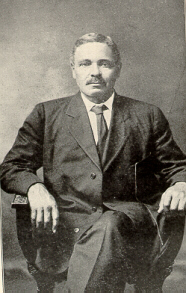

He was born in what is now Jefferson County, W. Va., just before the outbreak of the war between the States, so he has witnessed the whole period of the freedom of his people in America, and has himself been a factor in their progress. His parents were Frank and Rebecca Hatter, and his maternal grandparents, William and Lettie McCord, and his paternal grandparents, James Hatter and Matilda Hatter.
Coming of school age just after the war when the public free schools were in their infancy, young Hatter went to the Jefferson County schools from which he passed to Storer College, which had recently been established at Harpers Ferry. Here he pursued the Normal Course, which he completed in 1878, and spent two years in the academic department. Later he attended Nichols Latin School at Lewistown, Maine; and when ready for college, he matriculated at Bates College in the same State, where he won his A.B. degree in 1888. This simple narrative of his education conveys no adequate idea of the struggle and the years of hard work that went into it. As a boy and youth he worked at Charlestown as a mechanic and engineer. Later he learned house framing and gradually, under the direction of a skillful mechanic, became himself an excellent workman and was able to construct machines, make plows and do whatever came at hand. All this knowledge and skill were to play an important part in his career years later when he came to the work at Bluefield. He spent six years in New England altogether and ran a saw mill during his vacations. He made an excellent record at college and was graduated with second honor in psychology at Bates.
Returning to Storer College in 1888, he was identified with that institution for several years. Here he showed his versatility, teaching Latin, Greek and Mathematics. He also started the Industrial Department of Storer and erected the main building.
With the inauguration of the school for colored people at Bluefield, Mr. Hatter was appointed by Hon. Virgil A. Lewis to the head of the institution and served as principal for the first ten years of its history. Beginning with nothing, he practically created Bluefield Institute. He superintended the building, managed the school and taught at the same time. Sometimes even after that, he had to take his turn at guarding the property at night. The school grew steadily under his principalship. Meager appropriations were wisely expended, the enrollment of the school built up, the faculty increased and a definite curriculum arranged. All the time he kept in mind the idea of making the school of practical value by helping to train the leadership of the race. Better teachers, better preachers and better citizens all bear witness that he succeeded. Failing eyesight made a change necessary, so he went back to his work as a contractor and engaged in the real estate business. After a number of years in this field of endeavor he was to the great delight of the friends of the Institute induced to return to the school where he now acts as superintendent of buildings and grounds, has charge of industrial training and looks after the purchasing for the institution. No man of his race who has ever lived in Bluefield has stood higher in the estimation of both races than has Mr. Hatter. He is a member of the Baptist church and among the secret orders is identified with the Masons. In politics he is a Republican and has been active in the councils of his party. He was the first colored man in West Virginia to receive the regular party nomination for office. That was in Jefferson County and his popularity may be measured by the fact that he received more votes in Charlestown than did President Harrison in the same election. He has frequently attended County, State and National Conventions and has done considerable campaigning. Mr. Hatter has travelled considerably not only in this country but in France, England and Germany. He is a general reader with a special fondness for history. During the war he was active as a Four Minute Man. He is of the opinion that the thing most needed is simply "a man's chance to earn an honest living--a square deal."